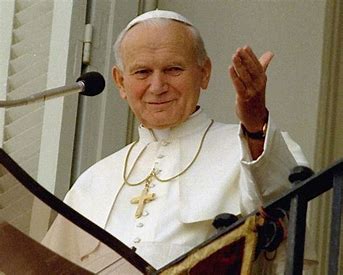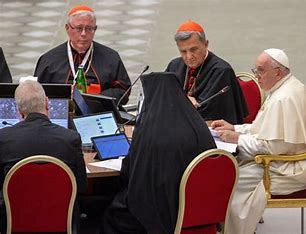 It’s doubtful that the organizers of the Synod on Synodality were aware that this year’s session would take place in the same year as the celebration of the 30th anniversary of the publication of Pope John Paul II’s encyclical Veritatis Splendor, ‘The Splendor of Truth’. At the same time the Synod participants are arguing over the relaxing the Church’s moral teachings, there’s a fresh spotlight on the encyclical in terms of books and articles. John Paul was warning the Church against exactly what is currently going on in Rome:
It’s doubtful that the organizers of the Synod on Synodality were aware that this year’s session would take place in the same year as the celebration of the 30th anniversary of the publication of Pope John Paul II’s encyclical Veritatis Splendor, ‘The Splendor of Truth’. At the same time the Synod participants are arguing over the relaxing the Church’s moral teachings, there’s a fresh spotlight on the encyclical in terms of books and articles. John Paul was warning the Church against exactly what is currently going on in Rome:
[A] new situation has come about within the Christian community itself, which has experienced the spread of numerous doubts and objections of a human and psychological, social and cultural, religious and even properly theological nature, with regard to the Church’s moral teachings. …Thus the traditional doctrine regarding the natural law, and the universality and the permanent validity of its precepts, is rejected; certain of the Church’s moral teachings are found simply unacceptable; and the Magisterium itself is considered capable of intervening in matters of morality only in order to “exhort consciences” and to “propose values”, in the light of which each individual will independently make his or her decisions and life choices.
That last part sounds a lot like the Synodal process as described in the Instrumentum Laboris, the preparatory document issued by the Vatican in anticipation of the current session:
[T]he protagonist of the Synod is the Holy Spirit”. Issues that are often posed in an adversarial manner, or for which the life of the Church today lacks a place of acceptance and discernment, can be addressed in an evangelical way within the synodal process.
 For Pope Francis, listening to the Holy Spirit will allow the Church (ultimately him through an apostolic exhortation) to speak prophetically:
For Pope Francis, listening to the Holy Spirit will allow the Church (ultimately him through an apostolic exhortation) to speak prophetically:
As we listen attentively to each other’s lived experiences, we grow in mutual respect and begin to discern the movements of God’s Spirit in the lives of others and in our own. In this way, we begin to pay more attention to “what the Spirit is saying to the Churches” (Rev 2:7), in the commitment and hope of becoming a Church increasingly capable of making prophetic decisions that are the fruit of the Spirit’s guidance.
For John Paul II, the role of the Holy Spirit is the opposite, as the guardian of tradition:
Within Tradition, the authentic interpretation of the Lord’s law develops, with the help of the Holy Spirit. The same Spirit who is at the origin of the Revelation of Jesus’ commandments and teachings guarantees that they will be reverently preserved, faithfully expounded and correctly applied in different times and places. …[I]t can only confirm the permanent validity of Revelation and follow in the line of the interpretation given to it by the great Tradition of the Church’s teaching and life, as witnessed by the teaching of the Fathers, the lives of the Saints, the Church’s Liturgy and the teaching of the Magisterium.
In a classic article written ten years ago during the 20th anniversary of the encyclical, Samuel Gregg called Veritatis Splendor “one of the most important papal texts in modern history”:
Veritatis Splendor was the first encyclical to spell out the Catholic Church’s fundamental moral teaching. Catholicism had, of course, always articulated the moral dimension of Christ’s message. Never before, however, had a pope provided a formal systematic outline of Catholic moral doctrine. That alone makes the encyclical a perennial reference-point for Catholic reflection.
He added that John Paul emphasized that the Church’s teaching was actually a blueprint for happiness:
[T]he prohibitions contained in God’s moral law are supposed to be a springboard toward human flourishing. For no matter how humble we may be by worldly standards, everyone is equal in the face of the demands of morality. That also means, however, we’re equally capable of greatness. In a world which encourages moral mediocrity, Veritatis Splendor insists that all of us are, with the help of grace, a potential Gianna Beretta Molla, Thomas More, Maria Goretti, or Karol Wojtyla.
If Saint John Paul II is correct, the opposite must be true as well: the lack of moral standards leads to human impoverishment. The outcome of the synod may have profound consequences for the Church.
…rjt
